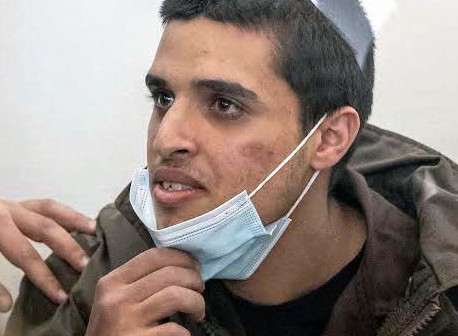Adalah to Israeli Supreme Court: Cancel Counter-Terrorism Law provision blocking release of Ahmad Manasra
CLICK HERE to read the Supreme Court’s decision
The motion was rejected for procedural reasons - the Supreme Court held that the arguments concerning the unconstitutionality of Article 40A of Israel’s Counter-Terrorism Law were not sufficiently laid out in the original petition to the Be’er Sheva District Court.
The Supreme Court also held that the constitutional arguments “involve weighty policy questions and carry significant broad implications, which go beyond the scope of the current case.” These questions, according to the Court, cannot be reviewed by way of indirect judicial review – as here, through the appeal of a prisoner’s petition – but rather only through a direct petition to the Supreme Court.
This is contradictory to previous Supreme Court decisions and significantly narrows the instances whereby one can challenge the constitutionality of a law in a specific case.
Adalah – The Legal Center for Arab Minority Rights in Israel and attorney Khaled Zabarqa filed a motion to the Israeli Supreme Court today, 3 October 2022, seeking permission to appeal a lower Israeli court’s decision to deny the early release of Ahmad Manasra. Manasra was arrested by Israel in 2015 in Jerusalem in a high-profile incident that garnered attention around the world.

Ahmad Manasra appearing in court (File photo)
On 1 September 2022, Be’er Sheva District Court affirmed Israel’s prison parole committee’s refusal to review Manasra’s request for early release. This motion was filed, in light of Manasra’s deteriorating medical and mental health situation, by Adalah attorneys Nareman Shehadeh-Zoabi and Adi Mansour in cooperation with Zabarqa.
In 2015, the then 13-year-old East Jerusalem resident Ahmad Manasra was arrested by Israeli authorities and was accused of attempted murder for being with his cousin Hassan Manasra, who committed a stabbing in Pisgat Ze’ev settlement in the occupied West Bank.
According to video documentation of the scene and subsequent media reports: His cousin “Hassan, who was 15 at the time, was shot dead by an Israeli civilian, while Ahmad was severely beaten by an Israeli mob and run over by an Israeli driver, suffering fractures to his skull and internal bleeding. A video showing Ahmad Manasra bleeding on the ground and gasping for help and Israeli bystanders shouting and swearing at the boy, telling him to ‘die’, garnered widespread attention and outrage. Another video of Manasra undergoing extremely harsh Israeli interrogation after the incident caused further anger.”
When Manasra reached the legal age of conviction, he was charged with attempted murder and was sentenced to 12 years in prison, which was later reduced to 9.5 years following an appeal to the Israeli Supreme Court. He has been held in solitary confinement for lengthy periods, and his mental health has severely deteriorated.
According to a professional medical opinion, Manasra’s condition requires immediate attention outside prison. Nevertheless, Israel’s parole committee decided not to review his case.
In its decision, Israel’s parole committee relied on a 2018 amendment to Israel’s Counter-Terrorism Law (Amendment No. 4), Section 40A, which stipulates that the parole committee can determine that the act for which a person was convicted constitutes a “terror act” and he or she will therefore not be eligible for the reduction of a third of his sentence or for early release.
This provision also applies retroactively to those convicted prior to Israel’s 2016 enactment of its Counter-Terrorism Law.
In the motion, Adalah and Zabarqa argue that Section 40A of the law creates two separate legal tracks for prisoners by arbitrarily excluding individuals from early release based on a determination of the parole committee that the act for which the prisoner was convicted constitutes an “act of terror”. According to the applicants, this distinction discriminates against Palestinians and infringes upon their constitutional right to equality. The applicants further argued that the sweeping application of Section 40A eliminates the individualistic examination of a prisoner’s particular circumstances – a core element in criminal proceedings.
Furthermore, applying Section 40A to both minors and adults without distinction completely disregards the special status of minors in Israel’s criminal law. Under Israeli law, the treatment of minors is regulated by separate legislation, “The Youth Law”, which is intended to “preserve their dignity and must give appropriate weight to considerations of their rehabilitation and reintegration into society.”
The motion also emphasized that Section 40A provides for its retroactive application, even for offenses committed before Israel’s enactment of its Counter-Terrorism Law. The retroactive application of Section 40A contradicts the principle of legality as enshrined in the Israeli penal law, and violates the principle of finality of judgments in criminal cases.
For all of these reasons, the applicants demanded the cancellation of Section 40A, which violates Israel’s Basic Law: Human Dignity and Liberty. Section 40A serves as a form of collective punishment and contradicts fundamental principles of criminal law.
Adalah attorneys Nareman Shehadeh-Zoabi and Adi Mansour commented:
Attorney Khaled Zabarqa commented:
CLICK HERE to read the motion [Hebrew]















